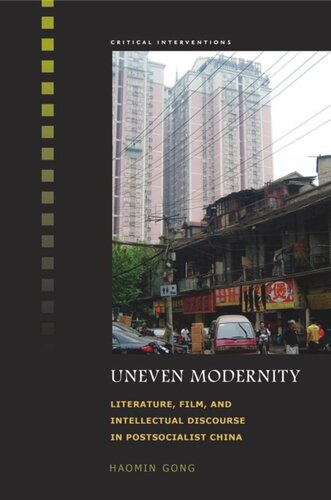

Most ebook files are in PDF format, so you can easily read them using various software such as Foxit Reader or directly on the Google Chrome browser.
Some ebook files are released by publishers in other formats such as .awz, .mobi, .epub, .fb2, etc. You may need to install specific software to read these formats on mobile/PC, such as Calibre.
Please read the tutorial at this link: https://ebookbell.com/faq
We offer FREE conversion to the popular formats you request; however, this may take some time. Therefore, right after payment, please email us, and we will try to provide the service as quickly as possible.
For some exceptional file formats or broken links (if any), please refrain from opening any disputes. Instead, email us first, and we will try to assist within a maximum of 6 hours.
EbookBell Team

5.0
28 reviewsPostsocialist China is marked by paradoxes: economic boom, political conservatism, cultural complexity. Haomin Gong’s dynamic study of these paradoxes, or “unevenness,” provides a unique and seminal approach to contemporary China. Reading unevenness as a problem and an opportunity simultaneously, Gong investigates how this dialectical social situation shapes cultural production. He begins his investigation of “uneven modernity” in China by constructing a critical framework of unevenness among different theoretical schools and expounding on how dialectical thinking points to a metaphysical paradox in capitalism and modernity: the inevitable tension between a constant pursuit of infinite fullness and a break of fullness (unevenness) as the means of this pursuit. In the Chinese context, this paradox is created in the “uneven developmentalism” that most manifestly characterizes the postsocialist period.
Gong goes on to investigate manifestations of the dialectics of unevenness in specific cultural events. Four case studies address respectively but not exclusively literature (the prose of Yu Qiuyu), popular fiction (Chi Li’s neorealist fiction), commercial cinema (the movies of Feng Xiaogang), and art-house cinema (Wang Xiaoshuai’s filmmaking). Representing different aspects of cultural production in postsocialist China, these writers and directors deal with the same social condition of uneven development, and their works clearly exhibit the problematics of this age.
Uneven Modernity makes a significant contribution to the burgeoning field of China studies as well as the study of uneven development in general. It addresses some of the most popular, yet understudied, cultural phenomena in contemporary China. Specialists and students will find its insights admirable and its style accessible.